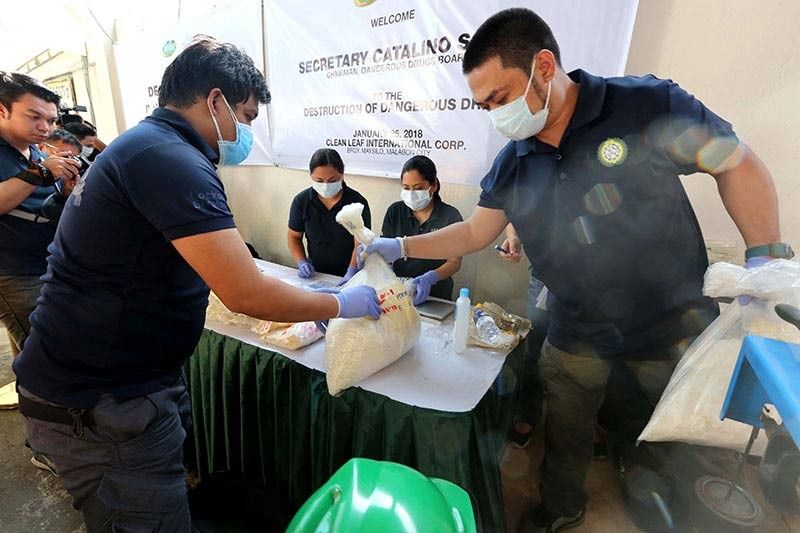What even is a 'drug czar'?

MANILA, Philippines — President Rodrigo Duterte on Monday claimed that he would be transferring his "law enforcement powers" to Vice President Leni Robredo for six months.
This came as a response to Robredo's call for the administration to recalibrate their crackdown on illegal drugs which she pointed out was "obviously not working" and in need of "tweaking."
Robredo has so far opted to ignore the supposed offer, saying she is not sure if it is a serious offer.
RELATED: Nothing in writing, but Panelo insists offer for Robredo to be 'drug czar' is serious
More of an offer
Presidential spokesman Salvador Panelo at a media briefing clarified that Duterte was offering to appoint Robredo as "drug czar," adding he had sent the vice president a text message about the offer. It is unclear if the number that Panelo sent a message to, and later tried calling, is actually the vice president's.
He said that the move was "more of an offer than a challenge" on the part of the president.
He even displayed his phone to reporters on Wednesday, showing the message that said, "May offer tabi sa imo si PRRD na mag Drug Czar ka for six months, will you accept?" Robredo did not respond.
Although he asserted that the offer was not a challenge, Panelo also quoted the president's challenging words in offering Robredo the position: "kung magaling ka yata, sige, binigay ko sayo kung may magagawa kang paraan."
Drug czar?
The position, however, does not exist as an official rank or title in the Philippine government, although it is sometimes used colloquially to refer to the chief of the Philippine Drug Enforcement Agency.
The president may also have meant putting Robredo in the Dangerous Drugs Board, which according to the Comprehensive Dangerous Drugs Act, is "the policy-making and strategy-formulating body in the planning and formulation of policies and programs on drug prevention and control."
The board consists of members of the Cabinet and "three permanent members, who shall possess at least seven-year training and experience in the field of dangerous drugs and in any of the following fields: in law, medicine, criminology, psychology or social work."
The president may appoint a chairperson from among the three permanent members.
The DDB also has an executive director "with the rank of an undersecretary, who shall be the Secretary of the Board and administrative officer of its secretariat, and shall perform such other duties that may be assigned to him/her."
All of those positions require the appointee to "possess adequate knowledge, training and experience in the field of dangerous drugs, and in any of the following fields: law enforcement, law, medicine, criminology, psychology or social work."
Although a bar passer and a holder of an Economics degree, whether or not Robredo is qualified to hold those positions, or whether they will be offered to her at all is yet unclear.
Legal basis
According to the 1987 Constitution, the vice president may also simultaneously take on a Cabinet portfolio on top of her current post, if the president so chooses to appoint her. She was briefly Housing secretary but resigned after she was sent a text message "to desist from attending all Cabinet meetings."
However, Panelo said that the "drug czar" offer, if accepted, would create a "task force" for Robredo to head.
According to him, this would not necessarily be a Cabinet-level position.
When asked by journalists about the legal reasoning behind extending such an offer, the presidential mouthpiece simply replied, "He is the chief executive and enforcer of the law. He can create [a] task force and appoint people to run it."
The PDEA is the primary agency tasked with implementing the government's campaign against illegal drugs.
Panelo seemed unsure of the logistics behind the offer, as he added, "That could be a special assignment, [but] he'll create a task force or a commission, whatever. She'll be on top of the situation."
READ: Can Duterte transfer his 'power to enforce laws' to Robredo?
Transfer of powers?
On the subject of transferring powers, Section 11 of the 1987 constitution stipulates: "Whenever the President transmits to the President of the Senate and the Speaker of the House of Representatives his written declaration that he is unable to discharge the powers and duties of his office, and until he transmits to them a written declaration to the contrary, such powers and duties shall be discharged by the Vice-President as Acting President."
Furthermore, the Administrative Code of 1987 says that "the president shall have control of all the executive departments, bureaus, and offices" and that he "shall ensure that the laws be faithfully executed."
As of this post, no written declaration or offer has been made public.
- Latest
- Trending



























